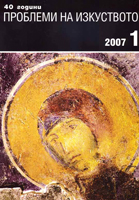Куковден – дионисов или кабирически обред?
Kykeon - a Dyonysian Rite or a Rite of the Cabiri
Author(s): Rossitsa Gicheva-MeimarieSubject(s): Cultural history
Published by: Институт за изследване на изкуствата, Българска академия на науките
Summary/Abstract: Put forth is a hypothesis of the etymology of the ritual names kuk, kuker, kukovden, in line with the Classical Greek κόκκος (seed), Middle Greek κουκί(ον)κουκί, Modern Greek κουκ(κ)ί and the name for broad beans and their seed. An important link in the etymological string is to be found in Chesychius (5th century), lema κουκάνα forefathers, ancestors, kykeon. The etymology is confirmed by the use of broad beans in the rite of participation in the kukeri feast and the acceptance of kukeri as elders, ancestors. In order to examine the hypothesis on the similarity between the ancient tradition of the cabiri and modern participation in kukeri feasts, the ancients beliefs of the kyamoi are examined. A supposition is supported by the argument, that when kyamoi are mentioned in the plural in ancient authors, the meaning is not only broad beans, but also hyoscymus - a herb with a strong hallucinogenic effect (cf. the Bulgarian ‘kuku’ - ‘mad, crazy’). An attempt has been made for the identification of elements of the herb in monuments of art in ancient Greece, Thrace and other eastern Mediterranean cultures. Together with an analysis of these monuments in the context of mystery cults. The parallels and analysis presented lead to the thesis of Semitic influences, long known in mystery cults, also related to the realia, semantic ritual practices and the etymology of names with roots “κοκ-”, “κουκ-”, “κύαμ-”.
Journal: Проблеми на изкуството
- Issue Year: 2007
- Issue No: 1
- Page Range: 36-50
- Page Count: 15
- Content File-PDF

